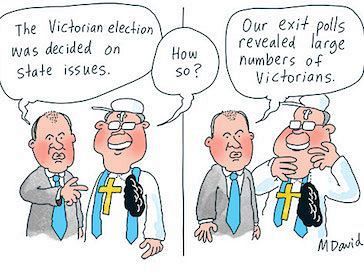Has the Morrison Government learned from the Liberal Party's Victorian State Election annihilation?
THE VICTORIAN LIBERALS have their work cut out for them. Their challenge for the next term will be if they can move beyond internal party conflicts to keep up with the ambitious and active agenda set out by the Andrews Government.
Following the resignation of Victorian Liberal Party President Michael Kroger, David Mond has also resigned as Party Treasurer and called for an urgent review into the Party’s toxic culture.
Michael O'Brien has replaced Matthew Guy as Liberal Leader and
'vowed to “reset the way we engage” with Victorians.'
The contamination has been a result of ongoing tensions between tradition and innovation — the selfish and bitter squabbles that are frustrating the population, who are responding in kind at both a state and federal level.
In the 2018 Victorian State Election, voters showed their disdain for the Liberal Party, who suffered a substantial loss of seats. In what used to be considered safe Melbourne suburbs, nine seats were lost to the Labor Party, with some surprising losses like Hawthorn and Bayswater.
The Liberal Opposition has the additional challenge this term in that the Government holds a significant majority over both houses, allowing them to pass legislation far easier than before. The Andrews Government currently holds 55 of the 88 seats in the Legislative Assembly and 18 seats in the Legislative Council. In the Upper House, the Liberal and Nationals only hold 11 seats (ten and one, respectively) and will find it difficult to prevent the Government from gaining the three votes they need to pass legislation.
As a consequence of this loss, the Liberal Party appears to be suffering from a confidence crisis, with factional power plays taking up all of the Liberals' energy rather than a focus on the issues at the forefront of voters' minds. The recurring line of criticism over the past year is that those in the Liberal Party are letting these divides cloud their judgment and have lost all touch with the people they are supposed to represent.
This was seen in the poor and unimaginative policy commitments the Victorian Liberal Party laid out in the lead up to the election. Its focus on fear, strengthening police control and harsher sentencing was cheap and tactless after the tragic Bourke Street attack. It barely acknowledged the growing energy concerns of Victorians and carelessly threw on the table a backward and expensive energy policy, perhaps thinking no one would notice.
This is concerning for the Liberal Party because as a whole, the standard principles of "liberalism" are fast fraying at the seams. At its core, "liberalism" is the idea that individuals should be left to their own devices, free and unhindered with as little of the government interfering in their rights and affairs as possible. Back when this political philosophy was formed, "conservatism" as we know it now had not emerged as a faction and the Liberal Party notion remained that society was built upon the individual and the family.
A discussion about the Liberal Party cannot go of course, without mention of Robert Menzies, but much of Menzies' philosophy is misappropriated and taken out of context. It was a different time, when Menzies viewed the individual and the family as the foundation of society. He wasn’t appealing to conservative or religious control, he was expressing the ideals of making Australians self-sustainable.
John Howard may have merged liberalism and conservativism in his "broad church" approach, but it was still an ambitious stretch. Conservatism and Liberalism were always going to be mismatched bedfellows; conservative beliefs starkly contradict that of liberalism. The more extreme each faction grows, the more conflicted and divided they appear, and in many ways, will seek to destroy the other. Liberalism – true liberalism – cannot allow for the breed of conformity that conservatism treasures. Conservatism will never respect the progress through risk that liberalism trusts individuals through free will and enterprise.
For both sides, it is the battle of securing control and leading Liberal figures and former premiers have expressed their disgust at the current state of the Party. Former premiers Jeff Kennett and Ted Baillieu have both stated that the Party’s compass needs to be reset back to its true north.
Former Opposition Leader John Hewson has declared PM Scott Morrison's energy policy as defiantly "anti-liberal" and asks why it is that those who dump toxic waste into rivers are punished, yet similar logic does not apply to companies who pollute the air with thousands of tons of CO2. They are not punished but, in fact, protected by the Coalition Government — a class of government interference that runs so against liberal beliefs.
Something is rotten in the state of the Liberal Party. A rancid atmosphere has corrupted the Party’s culture, finances and performance, and many members and leaders are beginning to question why they are still in the Party. Doubt can be the fastest avenue to defeat and if Party members get a whiff of hopelessness, it can be hard to find the courage to carry on.
All these hypocrisies and contradictions mean that voters are more than disillusioned now, they are grumpy. And the Federal Government isn’t listening. Will they prick up their ears in time for the 2019 Federal Election?
Grace Coleman is a Melbourne policy analyst, clown and graduate of politics, philosophy and economics. You can follow Grace on Twitter @colemangrace94.
 This work is licensed under a Creative Commons Attribution-NonCommercial-NoDerivs 3.0 Australia License
This work is licensed under a Creative Commons Attribution-NonCommercial-NoDerivs 3.0 Australia License
Support independent journalism Subscribe to IA.











